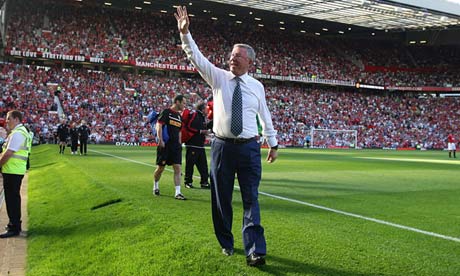End of an era as Alex Ferguson calls time at Manchester United
Barney Ronay on how Sir Alex changed football and leaves his likely successor, David Moyes, with the hardest of acts to follow

The Guardian,
Reading on mobile? Click here to watch video
Like the end of the world, for those who follow English football closely, the retirement of Sir Alex Ferguson was always one of those things it's probably best to imagine never actually happening at all.
But then a slight loss of scale is entirely par for the course when contemplating Ferguson's outsized footballing presence. In the star-struck official biography, Fergie, even the moment of his birth in 1941 is consumed by historical potency. "On New Year's Eve, Prime Minister Churchill confidently told the Canadian parliament that 'the tide is turning'," Stephen Kelly writes. "Alex Ferguson was born that same day."
And so, 72 years on from his part in Adolf Hitler's downfall, and having learned from his previous botched attempt to leave the stage a decade ago, Ferguson's retirement, rumoured late on Tuesday and announced on Wednesday morning, arrived with the startling suddenness more usually associated with a major news event. The announcement even forced Manchester United's share price down by 4.5% to less than $18 on the New York stock exchange initially but by the close it had bounced back to $18.44 – a 1.76% fall overall.
English football's longest serving manager will retire immediately after the Premier League fixture against West Bromwich Albion at the Hawthorns on 19 May, the 2,154th professional match of a 39-year journey from scowling, overcoated touchline tyro at East Stirling, to scowling, overcoated touchline eminence of the global Premier League.
The next few days will naturally be fraught with questions surrounding the Everton manager David Moyes' likely succession, and of related disintegrations, the secondary aftershocks of Ferguson's departure.
At the same time, if ever there was a managerial career that demanded a moment to stand and reflect then this is surely it. Even now at the point of pre-departure there is an urge to hold Ferguson up to the light of history in search of a sense of scale, if only to determine a little more clearly exactly what it is we're saying goodbye to. And above all to take a stab at assessing whether Ferguson really is, as has already been widely claimed, the greatest British manager of all time.
It must be said at the start that this is not so much a difficult question as an impossible one. Ferguson's career is essentially sui generis, an unrepeatable footballing life that represents a lone thread running right through English football's own brilliantly disorienting wonder years. This is a sport that has been violently re-fashioned in the last 30 years, a clanking Victorian industry regurgitated as relentlessly veneered global entertainment product. Ferguson alone has been there throughout it all, not so much unchanging as endlessly adaptive: at times the hotdog seller in the foreground of history, unblinking witness to profound and irreversible change; more often than not right there in the front of things with his hands plunged right in up to the elbows.
 Sir Alex Ferguson will retire at the end of the season. The Manchester United manager has had almost unparalleled success. Photograph: Dave Thompson/PA
Sir Alex Ferguson will retire at the end of the season. The Manchester United manager has had almost unparalleled success. Photograph: Dave Thompson/PA
His own footballing history is an almost complete compendium of the changes that have forged the modern game. Ferguson started playing professionally when there was still a wage cap in operation. He was present in the stands at the Ibrox stadium disaster. He lived, briefly, the old-school publican's life of the ex-pro before going on to manage in those pre-modern days, the years of institutional neglect that seemed set on strangling the sport's familial core. He curated English football's fiscally-driven transformation, not just winning the first Premier League, but breathing – via his vibrant young Manchester United teams – a life-giving brio into this new venture, providing the commercial revolution with a legitimising draft of new stories, new myths, new stars. And he remained in the vanguard through the full range of rapid fire cultural changes: foreign players, the shift towards Europe, overseas plc ownership, global brand building (Ferguson himself led an internal campaign at Old Trafford to establish the current investor-catnip mega-stadium). He has faced them all down, absorbed and adapted and tossed aside as required.
And as of today he is history too: but then we already knew that, to a degree that arguing about whether Ferguson is the greatest is bit like arguing about whether the British Library is the greatest British Library ever created, whether milk is the best universally available white dairy drink, or if your left leg really is your greatest left leg. Ferguson is basically what we've got. His is not so much a legacy to be debated on its merits, but a career to be enjoyed as a piece of shared living history. So put away the yardstick. We're not really going to argue about this, are we?
And yet, of course we are going to argue about this. In fact it would be an insult to Ferguson's professional memory to mark the moment of his departure without a furiously irresolvable disagreement of some kind. There are some standard means of ranking football managers. First is the basic ledger method, the combined weight of total trophies won. This can be weighted to suit an argument: there are those who will point out that Bob Paisley remains the only manager to have won three European Cups (Ferguson has two). Brian Clough's starburst of success between 1977 and 1980, a league title and two European Cups, is perhaps more spectacular. While unlike Herbert Chapman in the early 1930s, Ferguson didn't revolutionise the way the sport was played, or like Don Revie at Leeds or Bill Shankly at Liverpool, take a team out of the doldrums and turn it into a European giant.
And yet, get back to the numbers game and there is nothing to suggest he wouldn't have done so had it been required. Ferguson wins hands down here, staggering off under the combined weight of 13 English league titles, three Scottish titles, 16 domestic cups and four major European trophies. He has both the Scottish first division title and the Fifa Club World Cup. On his own he's won more trophies than Arsenal, who first started trying to win them in 1886.
Reading on mobile? Click here to watch video
Beyond this the other standard measure of managerial ultimacy is the sense of team-building and era-construction. This has long been the key to Shankly's greatness, a manager who created at Liverpool a new sense of shared identity with the club's support, a togetherness among club, city and matchday fans that defined the best aspects of the big city powerhouse clubs of the 1960s. Similarly Matt Busby, Ferguson's most obvious inhouse point of comparison, rebuilt United twice out of wartime rubble and subsequent tragedy.
Working within a more regulated footballing culture, Ferguson can claim to have forged an era or two of his own. First of all at Aberdeen, where his success in wresting the ascendancy away from Rangers and Celtic is a brilliant footballing story in its own right. The team that beat Real Madrid to win the Cup Winners Cup crowned the first great Ferguson era: and they've kept coming ever since, interrupted only by those fallow first five years at Old Trafford when, during the dog days of 1989, some United fans called for him to be sacked. In the years since, Ferguson has repeatedly demonstrated his own greatest strength, the ability to continue to learn and evolve even in moments of triumph. He created a thrillingly muscular champion team, at a time when English football was still a thrillingly muscular business. He oversaw the refinement of a glorious coincidence of youthful talents. He mastered the more mannered rhythms of the Champions League. He returned again to the domestic apex after the mini-eras of Arsene Wenger and Jose Mourinho, coming back from the personal disaster of his involvement with the Rock of Gibraltar race horse in 2003 to oversee the culmination of his last really great team five years ago.
At the end of which he leaves not just an empty space, but a sense of broader endings. Ferguson's managerial strength was in the end bound up in his longevity, the ability to bridge and encompass such distinct and instructive eras. This is a school of managerial opportunity that is now closed. Nobody will ever do this again, just as nobody really manages like Ferguson at the top level any more, seeking to take charge of a club from top level down, a practice learned from the arch all-seeing eye, Jock Stein, who would routinely answer the club telephones at Celtic and once at the height of his powers stood on a motorway island directing supporters' cars back to Glasgow after a match was postponed.
Alongside this, Ferguson has bolted on with great adaptive intelligence the full range of modern skills: control of the junior millionaire; a facility with agents, media and corporate overlords; and of course mastery of the wretched mind-games, the relentless unsettling, as required, of his opposite number.
Like a kind of managerial Elvis, Ferguson was there in the front rank when the world was changing, shaping its face, defining its terms, hogging the best seat.
Just as the internal and textural workings of English football have altered completely on his watch, so Ferguson got there first and stuck his flag in. There are few things that don't bear his imprint in the post-Ferguson Premier League, to the extent that something fairly dramatic is going to have to happen in English football to escape that lingering presence. He may be gone, or at about to go, but the likelihood is we'll still be playing Fergie-ball for some time to come. Not to mention pottering in the shadow of a manager who is perhaps not just the greatest yet, but with the revolution now been and gone, and the role of the manager itself increasingly circumscribed, great in a way that cannot and will not come again.
No hay comentarios:
Publicar un comentario